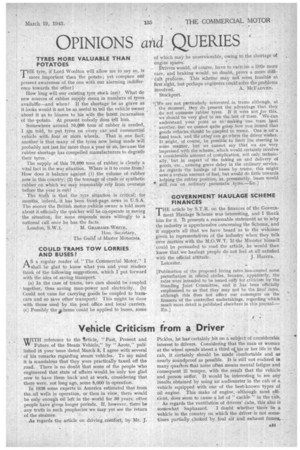OPINIONS and Q UERIES
Page 33

If you've noticed an error in this article please click here to report it so we can fix it.
TYRES MORE VALUABLE THAN POTATOES
THE tyre, if Lord Woolton will allow me to say so, is more important than the potato ; yet compare our present awareness of the one with our alarming indifference towards the other!
How long will our existing tyre stock last? What do new sources of rubber supply mean in numbers of tyres availattle—and when If the shortage be as grave as it looks would it not be as useful to tell the vehicle owner about it as to blazon to his wife the latest incarnation of the -potato. At present nobody does tell him.
Somewhere around .70,000 tons of rubber is needed,
I am told, to put tyres on every car and commercial vehicle with four or niore wheels. That is one fact; another is that many of the tyres now being made will probably not last for more than a year or so, because the rubber shortage has compelled manufacturers to degrade their tyres.
The supply of this 70,000 tons of rubber is clearly a vital fact in the war situation. Where is it to come from? How does it balance against (1) the volume. of -rubber .now in this country; (2) the tonnage of crude or synthetic rubber. on which we may reasonably rely from overseas before the year is out? The truth' is that the tyre situation is critical; for months, indeed? it has been front-page news in U.S.A. The sooner the British motor-,vehicle owner is told more about it officially the quicker will he cc-operate in saving
• the situation, far none responds' more willingly to a national call once he has.the facts.
London, S.W.1. M. GRAHAME-WHITE,
Hon. Secretary, The Guild of Master Motorists.
COULD TRAMS TOW LORRIES AND BUSES?
AS a regular reader of "The Commercial Motor," I shall be glad to _know what you and your readers, think of the following suggestions, which I put forward with the idea of saving transport. • .
(a) In the case of trams, two cars should be coupled together, thus saving man-power and electricity. (b) Could not vans for carrying goods be coupled to tramcars and so save other' transport? This might be done with those used by the post office and local carriers. (c) Possibly the theme could be applied to buses, some
of which may be unserviceable, owing to the shortage of engine spares. Drivers would, of course, have to exercise a little more care, and braking would, no doubt, prove a more difficult profilem. This Scheme may not seem feasible at first sight, but perhaps engineers could solve the problems
involved. A. MCFADYEN. Stockport.
'[We are not particularly interested, in trams although, at the moment, they do present the advantage that they do not consume rubber tyres. If it wdre not ,for this, we should be very glad to see the.la'st of them. We can understand your point as to 'making one tram haul
' another, but we cannot quite grasp how you intend that goods vehicles should be coupled to trams. One is on" a
' fixed track, and the othes can go where the driver wishes. It might, of course, be possible to limit the steering in some manner, but' we cannot say that we are very impressed with the scheme, which would certainly involve 'a considerable ,amount of complication, not only technically, but in respect of the taking on and delivery of goods, etc., causing grave delay in the ordinary, service. As regards the haulage of buses by trams, this might save a certain amount of fuel, but would do little towards helping the rubber position, as, presumably, buses would still run on ordinary pneumatic tyre5.—ED.]
GOVERNMENT HAULAGE SCHEME FINANCES
TIE article by S.T.R. on the finances of the Govern-rinent Haulage Scheme was interesting, and I thank him for it. It presents a reasonable statement as to why the industry is apprehensive concerning the Scheme, and it supports all that we have heard as to the welcome given to representatives of the industry when they talk Over matters with the M.O.W.T: If-the Minister himself ' could be persuaded to read the article, he would then know that we haulage people do not feel at all satisfied
with the official attitude. J. HAINES. Leicester.
[Publication of the proposed hiring rates has,caused some perturbation in official circles, because, appaiently, the rates were intended to be issued only for criticism by 'the Standing Joint Committee, and it has been officially emphasized to us that they' may not be the final rates., although this does not affect our comments on the finances of the controlled undertakings, regarding which much more detail is published elsewhere in this.journal.— ED .]




















































